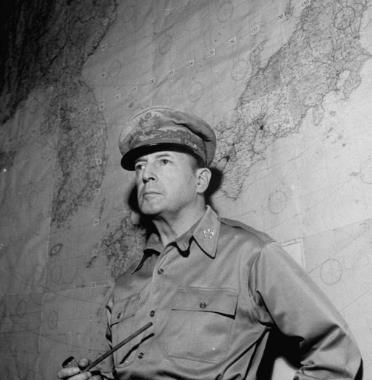If he had died before October 25, 1950, MacArthur would have been one of the most brilliant generals in the history of the U.S. military, not one of them, after all, too many halos were worn on his head. After shaking his hand, a priest trembled and said, "I have seen the flesh of God," which shows that MacArthur's popularity is all-round and full of dead ends. In China, however, MacArthur is synonymous with straw bales, which we do not intend to belittle, all starting from October 25, 1950.

Stand in front of MacArthur on the map of East Asia
MacArthur came from a military family and was a shogun. His father, Arthur MacArthur, rose to prominence during the Civil War and eventually became a lieutenant general. MacArthur inherited the family's genes and achieved a series of enviable achievements:
The youngest principal of the United States Military Academy at West Point, the holder of the best results of the United States Military Academy at West Point, the youngest brigadier general in the history of the United States Army, the youngest chief of staff of the United States Army, the first American general to serve as a marshal of foreign (Philippines) troops, the inventor of the frog jumping tactic, the king of the US landing war, the emperor of Japan, the uncrowned king of the United States, and even President Eisenhower was also his little follower.
MacArthur, who had just become president of West Point
On September 15, 1950, MacArthur commanded the U.S. Marines to land at Inchon, turning the tide of the entire Korean theater in one fell swoop. The success of the operation brought his personal prestige to the top. Even president Harry Truman sent telegrams to pat him on the ass, and MacArthur's eyes could not accommodate anyone.
After recapturing the 38th Parallel, MacArthur ignored warnings from all sides and continued to march north, targeting the Yalu River. Some of these warnings also came from American politicians, such as Truman. He sent MacArthur a very tangled telegram saying: If you encounter Chinese, disengage immediately; let Syngman Rhee's army go first near China; and don't enter Chinese territory. But MacArthur only glanced at it and threw the telegram in the trash.
MacArthur, who was directing the Landings at Inchon
Truman received more and more information about the possibility of Chinese troops, and he was also confused, so he decided to meet with MacArthur and listen to the analysis of the front-line commander. Surprisingly, Truman, as the commander-in-chief of the three U.S. armed forces, could not move MacArthur.
The first call was rejected by MacArthur on the grounds that he was "very busy." The second time he placed the meeting in Hawaii, where the two sides needed to fly the same distance to get there, but they were refused. The third time, Truman had to take the initiative to go to MacArthur's territory to learn about the military, which was also the first time in the history of the U.S. military. Outsiders commented that this was not like the commander-in-chief wanting to see his men, but rather like a meeting between the heads of state of the two countries.
Shake Truman's hand but look at him
As rude as it was, MacArthur gave Truman a reassurance: Go home before Christmas! The latter believed, after all, that this was the most bullish general in American history. MacArthur himself was convinced, even if the Chinese with bolt-action rifles, marching on two legs, and no planes and tanks came? Scared you out?
Beginning on October 23, his troops marched north in two directions, and the troops on the east and west fronts were separated by more than 80 kilometers, and due to the barrier of the mountains, the east and west lines could not echo each other at all, becoming two lone armies. Han Xianchu, deputy commander of the Volunteer Army, who had been secretly in Korea for 4 days, smiled when he saw this information: If this is my subordinate, I will remove him from his post now, and this level can be a company commander at most.
A portion of the captured U.S. troops
On October 25, the first battle between the Chinese and American armies began. The 1st Cavalry Division of the US Army, which claimed to have been undefeated, was beaten to the head and annihilated more than 1,800 people in one battle. In the second campaign, the American troops on both the eastern and western fronts were divided and surrounded by volunteers, and it was only then that MacArthur came back and ordered the whole army to retreat.
But how easy is it to retreat? On the more than 200 kilometers of retreat road, there were ambushes of volunteers everywhere, and the wheels of american cars could not run on the two legs of the volunteers. As soon as the American troops heard the creaking sound of the snow, their scalps tingled with fear, and as soon as they heard the charge of the volunteers, they immediately retreated. The more than 200-kilometer retreat route was called "bloody walk" by the U.S. military.
MacArthur looked lonely after being dismissed
With the great rout of the American army, MacArthur's personal prestige quickly collapsed. Truman no longer had to speak carefully to him, calling him a "big liar," and politicians clamored to punish the war monger. The so-called "flesh of God" was swept away by a stick of the volunteer army, revealing the mud tire straw bag inside.
If he had a choice, MacArthur would have wanted to go back to October 25 and get away early from the Chinese who were wearing rubber shoes and nibbling on the snow and chasing him all over the mountains!